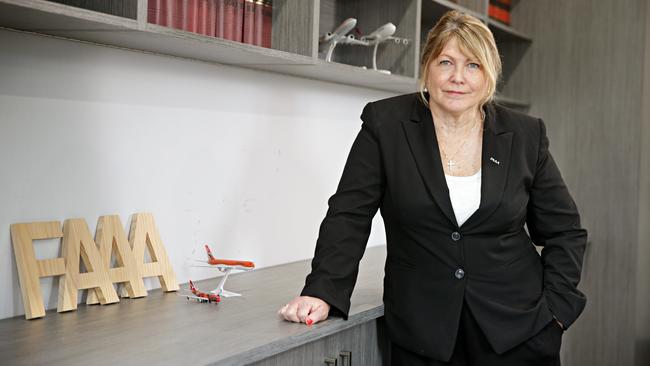Qantas facing more unrest in the west as pilots prepare to strike
The embattled airline, led by Vanessa Hudson, is facing further unrest in the west as Network Aviation pilots plan a 24-hour strike in their bid for a bigger pay rise.
Qantas is facing further disruption in the west, as its Network Aviation pilots prepare to strike on Thursday over moves to involve the Fair Work Commission in pay negotiations.
The Perth-based Network Aviation employs over 250 pilots to fly A320s and Fokker 100s on FIFO, charter and regular transport routes.
Qantas has offered the pilots an upfront pay rise of 25 per cent, and 3 per cent annual increases, but they are pushing for a 50 per cent hike to bring them into line with the airline’s 737 pilots.
After putting three offers to pilots, all of which were voted down, Qantas announced it would make an intractable bargaining application to the FWC in the hope of reaching agreement.
A new feature of the Fair Work Act brought in by the Albanese government, intractable bargaining applications, mean the FWC has the last say on the terms and conditions of employment in cases where parties cannot strike a deal.
Far from appeasing pilots, the move saw the Australian Federation of Air Pilots announce members would take industrial action on Thursday in an effort to push their case.
AFAP senior industrial officer Chris Aikens said Network pilots’ pay and conditions were significantly inferior to that of other pilots at Qantas and comparable airlines.
“The AFAP has been genuinely negotiating and trying to reach an agreement with Qantas management, but the company remains unwilling to revisit its inflexible wages policy instituted under the former CEO (Alan Joyce),” said Mr Aikens.
He apologised for the disruptions the industrial action would cause to the travelling public in Western Australia, along with FIFO mining workers and others reliant on Network and QantasLink flights.
A previous strike in October saw more than 40 flights cancelled in WA.
“With more than 90 per cent of Network pilots being AFAP members, the pilot group is highly engaged and keen to progress these negotiations towards conclusion,” said Mr Aikens.
The Australian and International Pilots Association which represented a smaller number of pilots at Network Aviation, supported AFAP’s right to take industrial action.
A Network Aviation spokeswoman said the planned industrial action was “disappointing”.
“We’re working on plans to minimise disruption to our customers if the union does go ahead with industrial action,” said the spokeswoman.
“Our proposed agreement, which was supported by all three pilot unions including the AFAP, for the two most recent votes, offers our pilots significant pay rises and more guaranteed days off each roster period.”

At the same time, the Flight Attendants Association of Australia was seeking to have the aircraft cabin crew award included in the Fair Work Commission’s review of modern awards.
Ordered by Minister for Employment and Workplace Relations Tony Burke, the review was focused on the arts and culture sector and workers with caring responsibilities.
FAAA federal secretary Teri O’Toole said the cabin crew award did not quite meet the criteria for the FWC review, but it was in desperate need of an update.
Used by a number of airlines and labour hire companies for cabin crew including Bonza, Jetstar and Qantas Altara, Ms O’Toole said the award failed to provide basic minimum protections for cabin crew.
Among the areas of concern, was the absence of minimum daily overtime allowances and a mere $15 a day payment to cover meals during some layovers.
“Cabin crew working under the award are being put on dangerously long duties, with allowances which do not cover the basic costs of meals,” Ms O’Toole said.
“Cabin crew and passengers deserve a better modern award safety net.
She said it was imperative that each of the concerns raised in the FAAA’s submission was addressed promptly and thoroughly.







To join the conversation, please log in. Don't have an account? Register
Join the conversation, you are commenting as Logout